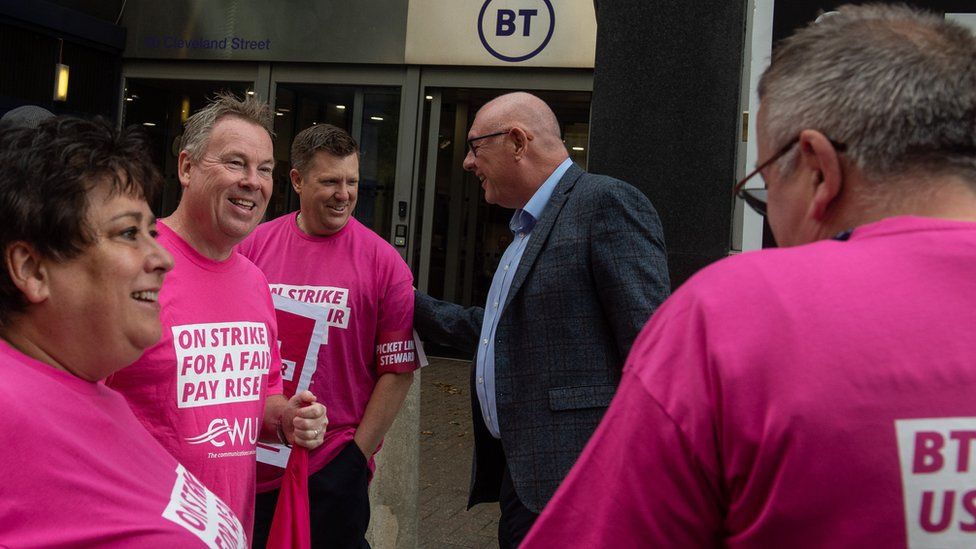Thousands of BT staff walk out in strike over pay
- Published
- comments

Thousands of workers at telecoms giant BT are walking out on Friday in the first of two strikes in a row over pay.
Engineers and call centre staff voted in favour of industrial action after BT offered a £1,500 per year pay rise.
The Communication Workers Union (CWU) said the action was the first national telecoms strike since 1987.
It has warned the strikes could affect the rollout of ultra-fast broadband, and could cause issues for people working from home.
But BT has said it had "tried and tested processes for large-scale colleague absences" to minimise disruption.
More than 40,000 workers are expected to walk out on Friday, with a second strike planned for Monday.
BT has repeatedly said it has made its best pay offer and will not be re-opening the 2022 pay review.
The CWU has previously criticised the deal, saying company bosses had "stuck two fingers up" to workers.
In an interview on the picket line on Friday morning, CWU general secretary Dave Ward said that BT staff urgently needed to have their wages increased in line with inflation.
"Our members are taking strike action after delivering a massive 'yes' vote for the first time in 35 years," Mr Ward told the BBC. "The reason for that is that they're desperate for a substantial pay rise to protect them against the cost of living crisis."
He said BT was in a strong position to pay workers more after recording £400m in profit in the first quarter. Mr Ward added that BT had plans to increase its prices by 22% over the course of 2022.
"Our members aren't prepared to put up with that anymore. I actually think it's bigger than the summer of discontent - I think what you're seeing now is working people saying enough's enough right across the UK," Mr Ward said.
Prices are rising in the UK at the fastest rate for 40 years, prompting workers and unions to call for pay rises to keep up with the cost of living.
Several industries, such as the railways, have already seen strikes this summer and more are planned.
On Thursday, BT revealed its first sales growth for five years as the telecoms firm benefited from price increases for customers earlier this year.
The group said it was also boosted by more people signing up for fibre-optic broadband and strong trading in its Openreach network business.
The company said revenues increased by 1% to £5.1bn for the three months to June 30.
BT said it engaged in "exhaustive discussions" with the union, before finally deciding on a £1,500 payment which is said is its "highest pay award in more than 20 years" for workers.
"We have confirmed to the CWU that we won't be reopening the 2022 pay review, having already made the best award we could," a statement said.
"While we respect the choice of our colleagues who are CWU members to strike, we will work to minimise any disruption and keep our customers and the country connected."
Related Topics
- Published19 July 2022
- Published30 June 2022
- Published28 June 2022